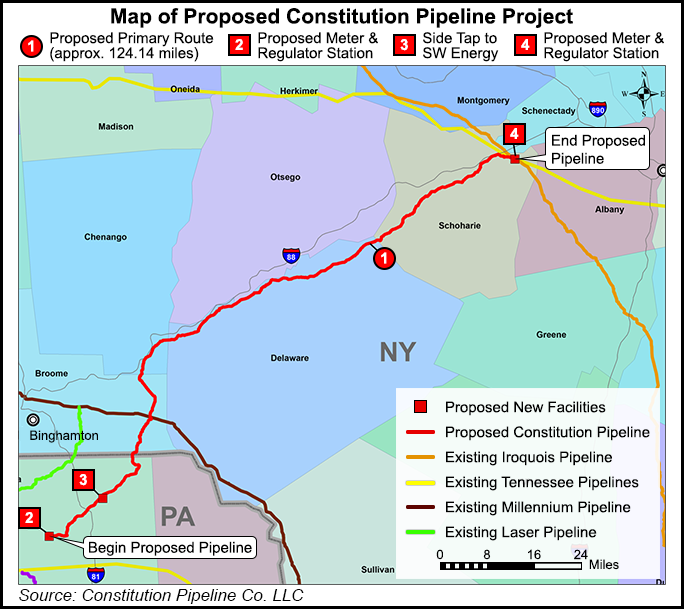Regulatory | Infrastructure | NGI All News Access | NGI The Weekly Gas Market Report
New York Cautions FERC on Waiving State’s Constitution Pipe Review
New York regulators warned FERC this week that if it waives the state’s water quality certification (WQC) review for the Constitution Pipeline project it should expect a swift appeal to the courts, where the state argues a waiver would stand little chance of holding up.

“In light of the irreparable environmental harm that would be caused by construction of the project and the likelihood that a court would reverse a finding of waiver, any FERC order finding waiver should be stayed until judicial review is complete,” the New York State Department of Environmental Conservation (DEC) said in a filing on Monday. A finding of waiver, the agency added, “would be subject to serious challenge on appeal,” especially considering the U.S. Court of Appeals for the Second Circuit’s decision in 2017 to uphold the agency’s denial of Constitution’s WQC.
Constitution has battled the DEC since 2016, when after nearly three years of regulatory review the WQC was denied. The project was given a second chance, as the Federal Energy Regulatory Commission plans to reconsider its decision last year about whether New York took too long to issue a decision on the WQC. The Commission had refused to waive the DEC’s authority, finding that the agency didn’t fail to act on the WQC application within the one-year timeframe required by Section 401 of the Clean Water Act, as the project sponsors had argued.
FERC plans to reconsider the matter following a ruling by the U.S. Court of Appeals for the District of Columbia (DC) in an unrelated hydropower case that favored Constitution and addressed similar issues, Hoopa Valley Tribe v. FERC et al, No. 14-1271.
Constitution’s sponsors filed for a WQC in August 2013, but the application was withdrawn and resubmitted twice, which DEC argued reset the one-year deadline it had to make a decision each time. FERC agreed last year and refused to waive the state’s regulatory authority.
In the Hoopa Valley case, the DC Circuit ruled that FERC should proceed with a review of the Klamath Hydroelectric Project, a 2004 proposal by electric utility PacifiCorp to build a series of dams along the Klamath River in California and Oregon. The court held that withdrawing and resubmitting WQC applications “does not trigger new statutory periods of review.” A three-judge panel ruled that, when an applicant and a state explicitly agree to delay a WQC, states defy the CWA’s requirement for action within a reasonable period of time.
FERC accepted comments through Monday on the impacts of the hydropower case. In its filing, DEC urged the Commission to stick with its decision last year denying the waiver. The agency said the Hoopa Valley decision does not apply to Constitution and the state’s handling of the project’s WQC application.
“Hoopa Valley was a narrow decision which is properly limited to the unusual facts of that case, where two states entered into a written agreement with the operator of a hydroelectric dam to delay indefinitely the operator’s application for a section 401 certification,” the DEC wrote in its filing. “Indefinite delay was achieved by having the operator purport to withdraw and resubmit its application every year via a one-page form letter. The applicant had no intention of obtaining a section 401 certification from the states, and the states had no intention of taking any action on the moribund application.”
Furthermore, DEC argued that Constitution’s sponsors never challenged the legal validity of the withdrawal and resubmission process, and instead argued that the agency failed to act within a reasonable period of time. Constitution, DEC said, “cannot now retroactively invoke Hoopa Valley to supplement its defective petition.” The agency added that there was no kind of agreement between it and Constitution like there was in the Hoopa Valley case.
For its part, Constitution said the Hoopa Valley opinion “clearly shows” that the Commission must reverse last year’s decision and waive New York’s authority, which would clear a major roadblock that has stymied the project for three years now.
Even if Constitution receives a favorable outcome at FERC, an uphill battle remains as other regulatory hurdles would need to be cleared and as environmental groups have signaled that they plan to continue challenging other aspects of the project in court. DEC officials also told NGI late last month as the deadline to make Monday’s filings loomed that it would continue to pursue every available option “to vigorously defend its authority to protect water quality and critical natural resources of the state.”
The 124-mile Constitution Pipeline would carry 650 MMcf/d of Appalachian gas from Susquehanna County, PA, to an interconnect with the Iroquois Gas Transmission and Tennessee Gas Pipeline systems in Schoharie County, NY. The project is backed by Williams, Cabot Oil & Gas Corp., Piedmont Natural Gas and WGL Holdings Inc.
© 2024 Natural Gas Intelligence. All rights reserved.
ISSN © 1532-1231 | ISSN © 2577-9877 | ISSN © 1532-1266 |
